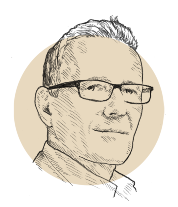Depending on which country you are in, the same word can have different meanings. In the United States, being liberal means being left-wing; in France, it means being conservative. To make matter worse, the term is ambiguous, simultaneously describing a culture, a state of mind, and a technique of government.
Everything started with the adjective “liberal,” which used to mean a profession pursued freely. In the Middle Ages in Europe, the field of arts libéraux covered subjects including grammar, rhetoric, music, and astronomy. Even today, the French talk about professions libérales, generally meaning intellectual jobs (lawyers, architects, doctors, etc.) whose practitioners work freely, or at the very least under the authority of a single professional organization such as an order.
The neologism “liberalism” first appeared in the early 19th century in Spain, where it was used by supporters of the constitutional regime established in 1812 by the junta of Cádiz. It then spread to the rest of Europe in 1815. The first person to actually define it was French philosopher Maine de Biran (1766-1824), who described it as “a doctrine favoring the development of liberties.”
Liberalism is actually an ancient concept, dating back to before the term even existed. It is thought to have begun in Great Britain in the 17th century, before developing in Europe during the Enlightenment of the 18th century. As an ideology of the rising bourgeoisie, it emerged as an opposing force against feudalism, noble privilege, and the absolutism of regimes based on divine right. Some of its most prominent early theorists include John Locke, Adam Smith, John Stuart Mill, Thomas Malthus, and David Ricardo in England, and Jean-Baptiste Say, Benjamin Constant, and Alexis de Tocqueville in France.
Much like a doctrine, liberalism offers a repertoire of values presented in different ways depending on the time period and context of each nation. The most important values include individual freedom, tolerance, human rights, and respect for the rule of law. However, there are differences between its economic and political ideologies. Economic liberalism considers that the pursuit of profit and the satisfaction of individual interests are the best ways to foster progress. The right to free enterprise, purchases, sales and, of course, possessions, make up the foundation of this philosophy.
Meanwhile, political liberalism describes a system of government based on a plurality of political parties and the freedom of citizens to choose their leaders. While the state plays an essential role as a mediator in cases of conflict, its intervention in the economic market should be strictly minimal. Economic and political liberalism are so closely connected because they rely on the same principles: Individuals are capable of making their own choices, and competition between said individuals is what truly drives the development of society.
However, according to its detractors, this form of liberalism is intertwined with the most brutal form of capitalism, only taking individuals into account to the detriment of collective needs. This is why, in an effort to respond to repeated criticisms from the social-democratic and Marxist left-wing, neoliberals accept state intervention – albeit on a limited scale. This is to prevent the growth of social inequalities which would endanger the very existence of the economic and social system.
The ultraliberal movement has developed alongside these ideologies, refusing all state intervention that might hold back individual initiative. Libertarians are even more neoliberal than ultraliberals, and defend unlimited individual freedom. Yet despite positioning themselves at the furthest right end of the economic spectrum, they have extremely progressive views on societal questions such as immigration, gay marriage, and drug use.
In reaction to the dominant liberal model, a school of thought has developed over the last few decades, calling into question the very foundations of Western democracy. Accurately described as “illiberal,” a whole host of leaders brandishing an extreme form of nationalism are currently trying to impose their own political and social model. Whether Vladimir Putin in Russia, Recep Tayyip Erdogan in Turkey, Viktor Orbán in Hungary, or Narendra Modi in India, these leaders have continued to restrict freedom of the press, subdue private enterprise, reign in judicial authorities, and chip away at the rights of ethnic, religious, and sexual minorities.
By way of conclusion, and to paraphrase a famous quote about democracy from Winston Churchill, liberalism seems to be the worst system – except for all the others that have been tried until now.
Article published in the September 2022 issue of France-Amérique. Subscribe to the magazine.












